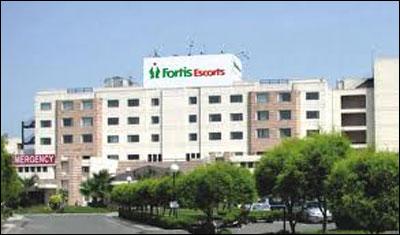Sushmi Dey and Nivedeta Mookerji in New Delhi
Government officials may soon find it difficult to get treated at private hospitals under the Central Government Health Scheme (CGHS). Fortis Escorts, a major player among private hospitals, has stopped accepting CGHS beneficiaries since October 7, citing long delays in reimbursement.
Sources said the hospital had turned away even those with prior appointments. Some other hospitals, including Medanta and Max, are also likely to follow suit.
Under CGHS, entitled government employees can avail of cashless diagnostics and treatment at hospitals, which send patients' bills directly to the government for settlement. For this, the hospitals and CGHS enter into a contractual agreement for a certain period, under which the price tag for each medical procedure is put down. If a hospital wants to revise any of the rates, it has to enter into a fresh agreement with CGHS.
A notice issued by Fortis Escorts Heart Institute says, with effect from October 7, the hospital will not renew its contract with CGHS. It adds no CGHS beneficiary will be entitled for IPD (indoor patient department) admissions and OPD (outdoor patient department) services at the hospital from this date.
A delay in payment was cited by several other private city hospitals, too. When contacted, Fortis Escorts declined to comment.
"There is distress as CGHS payments do not come in time. As it is, the services we provide under the scheme are at very low rates. And, because of delays in payments, we have to incur interest on the amount," said Naresh Trehan, the chairman and managing director of Medanta, a multi-speciality institute located in Gurgaon. Although Medanta has not discontinued its services to CGHS beneficiaries yet, it may be compelled to do so if payment-related problems are not resolved soon.
Though Max Hospital has also not discontinued the services yet, an executive from this hospital conceded there were serious problems in CGHS payments.
Another leading hospital, on the condition of not being identified, said it had stopped providing certain expensive services under CGHS, due to payment-related issues, though it had not completely blocked the beneficiaries of the scheme.
The Centre's annual CGHS budget was around Rs 1,600 crore (Rs 16 billion), of which Rs 1,000 crore (Ra 10 billion) was for hospital reimbursements, including those for medicines, said an official.
According to a recent World Bank report, titled 'Government-Sponsored Health Insurance in India', 562 private hospitals had tie-ups with the Central government for CGHS in 2010. A 2010 estimate puts the number of beneficiaries of the scheme at three million. They can also go to a public hospital.
When contacted, P K Pradhan, secretary in the ministry of health and family welfare, said: "We have not received any such complaint from any private hospital or patient. In fact, the whole payment process has been streamlined and is now going through a third party. So, there should not be a delay in payments."
The government has now made CGHS payments online, through UTIITSL, a financial and information service provider, said Pradhan.
CGHS' arrangement with private hospitals had started in the 1990s, before which Aiims was the only speciality hospital for government officials. To deal with the long waiting period at Aiims, the government had worked out the cashless transaction arrangement with private hospitals and increased the CGHS budget.
While ministers do not have to go to private hospitals through the CGHS route, all bureaucrats have to opt for the scheme.



article